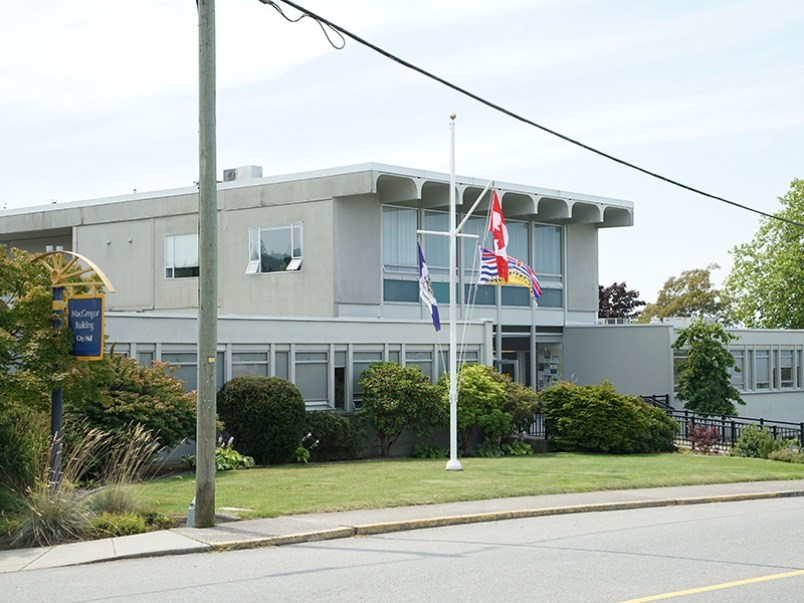City of Powell River Council has voted to reduce the city’s flat tax down to $50 by the 2022 tax year.
At the December 19 council meeting, councillors had a lively debate over the flat tax, which was $335 in 2018, $250 in 2019, will be $180 in 2020, $115 in 2021, and 50 in 2022 and beyond. The flat tax is an assessment paid by all improved properties in addition to the variable tax paid on assessed value of the property.
According to a report to council from chief financial officer (CFO) Adam Langenmaier, Powell River is one of only five municipalities remaining in BC that still levies a flat tax. He stated that the proposed reduction strategy is not intended to remove the flat tax; it is only intended to reduce the flat tax to a nominal amount.
During debate on the issue, councillor George Doubt, who chairs the city’s finance committee, said this will continue an action that council took beginning last year, to reduce the flat tax overall to make it what he deems, and others deem, as a more fair taxation. He said it shifts the burden of taxation to the value portion of the taxes as opposed to a flat tax on all properties.
Councillor Maggie Hathaway said she was glad to see this happening. She said she agreed with Langenmaier that it was a good thing to keep it at $50 because the city cannot get a flat tax again.
“It will give us some flexibility down the road,” she said. “That was a brilliant suggestion to keep it at $50, then we still have a flat tax if we need that flexibility.”
Councillor Rob Southcott said he also supported the reduction in flat tax. He added that he has concerns for the sector of the community that has worked hard for years, retired, and owns properties that are increasing in value and seeing tax increases disproportionate to their incomes.
Southcott said he is happy there is an easy remedy accessed by many people: the tax deferral program.
“It essentially gives anyone who wants relief from these taxes, and opportunity to defer their taxes,” said Southcott. “We exist in a speculative real estate market that is jacking values artificially, way beyond the real value of a home. I’m very thankful for this remedy and it alleviates my worry about those people who have lived in homes for a long time. I really hope they find out about this.”
Councillor Jim Palm said most residents do not understand what a flat tax actually means. He said even council is not aware of all of the ramifications around the reduction of the flat tax.
“It’s my responsibility, being an elected official, to make sure the taxpayers in this community are represented, and that’s one of the reasons why I ran to be in a seat here tonight,” he added.
Palm said he can afford the reduction of the flat tax but he was on council to represent people it affects the most. He said he has done a lot of due diligence on this, meeting with the CFO on three occasions.
“I speak from the heart and I speak for the people,” said Palm.
He said when he was first elected, in 2009, the flat tax reached its peak at $479. He said residents paid $250 last year. Going into 2020, the flat tax will have been cut by more than half from its peak level, said Palm.
Palm said the flat tax keeps taxes even across the board. When the flat tax is reduced, as was being proposed, the levelling of the field on the taxation front changes, because the people on the higher end are paying a lot more and the people at the lower end are paying much less in comparison, he said.
“I’m not against a gradual elimination of the flat tax, but one like this, over the next three years, is way overboard and overkill,” said Palm.
Doubt said he was taking the position that the value tax is a more fair tax because it is assessing the value of all of the residences and commercial properties in town at the appropriate tax level based on those values. He said the flat tax charges a certain amount of money for owning property and is not connected to the value of the property.
Doubt said the option to defer taxes is a valuable option.
Councillor Cindy Elliott said she did not believe the flat tax is necessarily a fair way to tax homes that are valued less, that end up paying a higher percentage of tax, when the flat tax is combined with the value tax.
Mayor Dave Formosa said he does not support the elimination of the flat tax.
“My concern is that we do have an issue seeing a lot of movement into the regional district,” said Formosa. “I get it. It’s much cheaper taxation, but they also get a lot less services. They have to deal with wells and problems with water, septic systems and what have you.
“When you get into a higher-end home, when you get your water bills and sewer bills, and your library goes up and RCMP goes up and your school taxes go up, this is just another hit that we add. It is driving citizens out of our community.”
Council voted to endorse the incremental reduction in flat tax with Palm and Formosa opposed.



